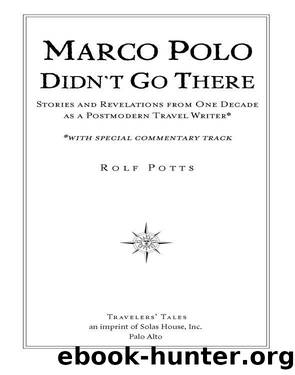Marco Polo Didn't Go There : Stories and Revelations from One Decade As a Postmodern Travel Writer (9781932361711) by Potts Rolf

Author:Potts, Rolf
Language: eng
Format: epub
Publisher: Perseus Book Group
Published: 2010-06-22T00:00:00+00:00
10
Backpackerâs Ball at the Sultan Hotel
My first instinct upon arriving in Cairo is to fear the pyramids.
This is not a fear of existential belittlement in the presence of the ancient megaliths, nor do I fear some presumed Pharaonic curse. Rather, I fear letdown. I fear I wonât see the grand old monuments with the proper degree of awe or historical perspective. I fear that in the process of comparing reputation with reality, I will be disappointed. I fear that the pyramidsâwhich have been perused, praised and plundered for thousands of yearsâwill prove, in experience, to be little more than a static tourist cartoon, devoid of genuine inspiration or beauty.
The most irritating part of this pyramid phobia is that I will ultimately be forced to confront it. After all, going to Cairo without seeing the pyramids is like a marriage without consummation: You can try it, but ultimately the obsession with what youâre missing will get the best of you.
I can procrastinate, howeverâand thatâs what Iâve resolved to do. Taking a taxi from the Cairo airport to Orabi Square at midday, I unsling my pack at a park bench, do a bit of reading and let the city soak in before I look for a place to stay.
My literary companion in Cairo is Gustave Flaubert, who, before penning Madame Bovary, traveled to Egypt in 1849 and recorded his impressions in a series of letters to his friends. Like me, the twenty-eight-year-old Flaubert was indecisive in his opinion of the ancient Pharaonic ruins. At times, he regarded the old tombs and temples with humble awe, but at other times he expressed disappointment at the realities of his tourist itinerary. âThe Egyptian temples bore me profoundly,â he wrote home at one point. âOh necessity! To do what you are supposed to do; to be always, according to the circumstances (and despite the aversion of the moment), what a young man, or a tourist, or an artist is supposed to be!â
In keeping with the age-old travelerâs instinct to seek on the road what one enjoys at home, Flaubert eased his tourist angst in Egypt by frequenting the local whorehouses. Not only did this activity provide his journal with some memorable passages (âCoup with Little Sophie: She is very corrupt and writhing, extremely voluptuousâI stain the divanâ), but it also gave him the impetus to stray from his luxury hotels and riverboats into the seedier parts of town. Here, Flaubert found the depraved exoticism heâd hoped for. âThere is one new element which I hadnât expected to see and which is tremendous here,â he wrote to a friend shortly after arriving in Cairo. âAnd that is the grotesque. All the old comic business of the cudgeled slave, of the coarse trafficker in women, of the thieving merchantâitâs all very fresh here, very genuine and charming. In the streets, in the houses, on any and all occasions, there is a merry proliferation of beatings right and left.â
Sitting on my bench, paging through Flaubertâs memoirs, I take in the sights of Orabi Square.
Download
This site does not store any files on its server. We only index and link to content provided by other sites. Please contact the content providers to delete copyright contents if any and email us, we'll remove relevant links or contents immediately.
| Publishing & Books | Research |
| Writing |
Asking the Right Questions: A Guide to Critical Thinking by M. Neil Browne & Stuart M. Keeley(5741)
Autoboyography by Christina Lauren(5217)
Eat That Frog! by Brian Tracy(4500)
Dialogue by Robert McKee(4375)
Sticky Fingers by Joe Hagan(4174)
Journeys Out of the Body by Robert Monroe(3603)
Annapurna by Maurice Herzog(3456)
Full Circle by Michael Palin(3432)
Schaum's Quick Guide to Writing Great Short Stories by Margaret Lucke(3362)
Elements of Style 2017 by Richard De A'Morelli(3331)
The Art of Dramatic Writing: Its Basis in the Creative Interpretation of Human Motives by Egri Lajos(3049)
Atlas Obscura by Joshua Foer(2940)
Why I Write by George Orwell(2933)
The Diviners by Libba Bray(2921)
The Fight by Norman Mailer(2917)
In Patagonia by Bruce Chatwin(2907)
The Mental Game of Writing: How to Overcome Obstacles, Stay Creative and Productive, and Free Your Mind for Success by James Scott Bell(2888)
Venice by Jan Morris(2558)
The Elements of Style by William Strunk and E. B. White(2460)
